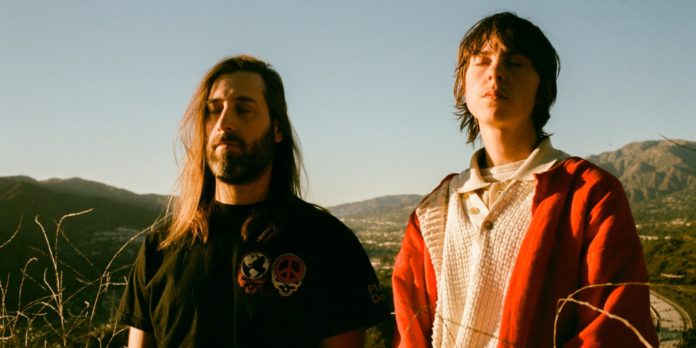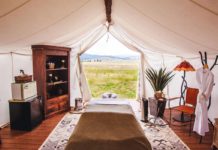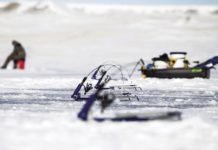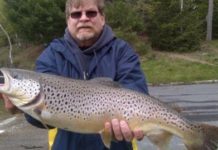Meg Duffy is the songwriter and guitarist who records as Hand Habits; Joel Ford is an LA-based producer who’s worked with artists like Jacques Greene and Oneohtrix Point Never. Together, they’ve formed the duo yes/and. To celebrate the release of their self-titled debut — out tomorrow via Driftless Recordings — the friends and now collaborators sat down to catch up.
— Annie Fell, Editor-in-chief, Talkhouse Music
Meg Duffy: I wanted to talk to you about getting outside of your comfort zone, or breaking through a plateau, creatively. What’s the last time that you can remember taking a risk that you knew was going to get you outside of your comfort zone, and what was the outcome?
Joel Ford: When I moved to Los Angeles, I was working on the last How To Dress Well record — I moved here in the middle of doing the record, which is really cool, because coming from New York and working with an artist who’s based in LA, I already had sort of one foot in the door in a way. I felt like I had something going already, my head was here already, in a sense.
But outside of actually physically moving here, it started a new era for me. People started asking me to work on their music in a slightly different capacity, where I was sort of the the main collaborator who was coming in to help finish the record — take the production, the writing, to finish that phase, and then come in and mix the record and fully finish it. I’d always sort of worked with another producer and an engineer or whatever. It was a step in the direction of handling everything myself, and so that was a big jump for me. I’ve kind of been working in that way for the past four years, all the time now.
Meg: After taking that risk.
Joel: Right. It was pretty organic the way it happened. Tom [Krell] and I had just met, and we started listening to his demos together and I was throwing out these radical ideas, like, “Hey, what if we took all of your vocals and this melody and trash everything underneath and rebuilt it and created a new thing?” And he was very adventurous and being like, “Yeah, let’s do it.” And so the risk was generally being more straight up about my thoughts about someone’s music, and being like, “This is what I want to do,” unfiltered. Whereas maybe I’d been a little bit cautious in the past. And then people started to trust me to help them finish their vision.
Meg: Was there any fear associated with being more vocal with your opinions with artists?
Joel: I’d kind of taken a break from being super immersed in music and doing it full time. I took a weird music industry job, and then had a kid, and was just figuring out how to do adult things and kind of put music off to the side for a minute. I think [being candid with your opinions] is kind of scary always, in a way that’s exciting. But I think at that time, for me, I had a lot of time away from that type of interaction. So coming back to it, I was very fresh and being like, “No, this is what we should do. I think this is the best version of the best path to this end, let’s try it.” And I think that’s also the result of just being a little bit older and more experienced in life, and knowing what I want. You know, being a little bit more honest with myself.
Meg: Identifying your tastes,
Joel: Yeah. Just being like, “This is what I think should happen and let’s do it.”
Meg: How did it feel to be honest with me when we were working together?
Joel: Frightening.
Meg: [Laughs.] Aw.
Joel: I mean, at first.
Meg: Why?
Joel: Because I didn’t know you that well.
Meg: Right, we really didn’t know each other that well.
Joel: We didn’t really know each other at all. So at first, I think that’s always scary. I think that with the type of music that we made for this record — I don’t know what it is about it, but for me, that type of music seems super intimate compared to other types of music that I’ve had experience making. I think because…
Meg: Because you made the record with a Pisces?
Joel: I think it’s more like, the type of music we were making is more like soul music for me personally.
Meg: Wow. Yeah, that is kind of your background.
Joel: Kind of, yeah.
Meg: Tweaker, experimental… Not folk songs, which is my background.
Joel: And for me, I sort of came up doing that with my friend Dan [Lopatin, Oneohtrix Point Never], and I only really did that with him ever. So I guess I just don’t have that much experience making left-of-center music with other people.
Meg: With no plan, too. That can make it feel really intimate, too.
Joel: Yeah. But I think we did a good job of establishing parameters and methodically going about our process in a pretty casual way.
Meg: Definitely. I felt like — can I tell you my experience?
Joel: Yes, please. I’m bad at asking questions, so you’re probably just going to have to tell me.
Meg: I ask questions as a way to avoid talking about my feelings, so now we’re even. For me, I found it really easy to be honest with you, I think because we didn’t know each other that well — which says a lot about me.
Joel: I understand that.
Meg: There wasn’t a predisposed bond that I was wary of shattering. Which I think in the past when I’ve worked with people that I had relationships with, I would tend to be hyper aware of what they were feeling, and want to just make sure that they were giving me approval or thinking that it was in line with something that they liked. It was liberating for me to come in and — not that I saw it as like, telling you what to do, because it was very collaborative and it was very back and forth. But in the times where I heard something, I just have such positive, vivid memories of being in the studio with you and saying, “Let’s run these three things through the reverb, but then mute the dry signal and then put that through the tape,” and not even knowing how to explain what I’m wanting to hear with you, and you just totally being down to execute it. I found that super inspiring and liberating and freeing, especially for the type of music we were making. Which started as just a pipe dream, I think, for me being like, “I want to make an instrumental guitar record, that sounds like what I do when I’m alone with my loop pedal or whatever.” And it came so far away from that, because you added so much of your knowledge.
Joel: Some of it was kind of more straight up that.
Meg: Yeah, of course.
Joel: But also that’s how we entered into the collaborative scenario. I was more like, “Hey, let’s do whatever you want.” And then it sort of slid a little bit back the other way. So in that way, maybe it was ideal in that at first, you didn’t have to worry about whatever, and then it kind of naturally found it somewhere in the middle.
Meg: It’s funny that it was also going to maybe be an acoustic [record] — like track one, which now is so misleading.
Joel: It’s cool though.
Meg: I love it too, “Craggy.” But yeah, I had just gotten a new acoustic and I have so many visions, you know. I want to make all these crazy records. To me, the most fun part of making music, the most special part of making music, is making the music. Then if it’s a touring situation, going on tour and watching the music evolve and change. But we, working together on this music, got to watch it evolve and change just the two of us, which I think is really intimate, too. And also, we started the music before the pandemic and then finished it during.
Joel: That’s crazy. Did we really start it before?
Meg: Yeah, we did, and then I went on tour. It was right before. And I personally went through a lot of emotional changes since we started it and since we finished, and I’m sure you have, too.
We all did, we went through a lot of changes. It’s been interesting how I reflect on a lot of the conversations that we have — especially even just talking about how we were going to make the titles and what the songs represented to each other. Because it’s instrumental music, the meaning’s not, like, slapped across your face with lyrics, and it’s not woven into the melodies in the same way. For me at least, when I write a song, it’s like, Oh, I’m saying these words so there is some predisposed understanding of what the song means or is about.
Joel: Did you feel like generally freed up and not having to think about it in that direct, literal way?
Meg: Yeah, definitely. I wanted to say, I agree with you that it did become more intimate, and at a certain point, more meaningful. Because in a way when I’m writing a song with lyrics for Hand Habits, it’s usually in this trance state where I will feel really overwhelmed by creative spirit, and that feeling comes and goes so quickly. Like once the song’s written, it’s kind of gone, and once it’s recorded, that feeling — it’s not gone, but it changes. The crest of that feeling is really palpable in the moment of writing a song. And then for our project, since I was a little bit more flippant about it, because it was more about expression and following these creative paths and vibing off of each other and having fun — because it was fun and recording song music is not always fun for me. But when we were doing the final lessons of the mixes and brainstorming visuals for titles, I found myself really emotional and having to assign meeting to the void, essentially. It was overwhelming at times.
So it was such a different experience making that kind of music, because I’m not like, “This is a song about me feeling guilty.” It was more of a soundtrack to my emotional landscape at the time, and based off of the conversations that I had shared with you. We were hanging out all day, and I’m pretty open in terms of my emotional landscape, so we were connecting really deeply. It’s interesting now to have it be something that other people are listening to and assigning their own meaning to, and it’s a little bit more veiled.
Do you have any experience making instrumental music — or, as you said, left-of-center, like, ambient or dance music — and assigning your own emotional landscape to it in the process, and then having to watch it change when it’s released?
Joel: Yeah, I’ve definitely had some funny journeys through pouring my heart into something and being like, “This is something that I poured my heart into!” And then it doesn’t translate for whatever reason, and then questioning the whole process after, being like, Why did I do that? Because now I opened myself up and got nothing back. Especially for someone [like me] — I don’t consider myself like a pure songwriter at all. So my versions of that have been, like, mildly traumatic, I guess. The past four years being Los Angeles, it’s been an interesting journey for me in just sheer frequency of collaboration, and then figuring out the emotional involvement at every step.
Meg: So how do you protect yourself?
Joel: I don’t really think I’ve figured it out. And maybe that’s something you never fully figure out. But I think that a version of navigating that, that I have decided I liked, is to kind of… I think mixing records is a little bit of a compromise there, where you both have to be emotionally involved to make things translate in an effective way, but often — especially lately — I’ve been working without the artists in the room. Which I think for mixing is helpful. I think getting them in to finish a record obviously can be great. But also doing the audio mover’s thing and having people listen from home, or just sending versions and getting notes back in a very standard way is definitely less emotionally taxing than sitting in a room navigating the ins and outs of little signifiers in the genesis of a creative process or whatever.
Meg: Yeah, the excitement is there.
Joel: Yeah. And I love that stuff, but doing it all the time back to back to back is not for me.
Meg: Right. Because there’s lacking an emotional depth, it sounds like you’re saying,
Joel: Well, it’s just super taxing. It’s also like one of my favorite things to do ever.
Meg: Mixing?
Joel: No, just being in that moment with an artist being, like, “Yeah, we’re doing it!” It’s the best thing ever. But doing it all the time is almost just like drugs or something. Like if you’re doing it all the time, you’re going to burn out, right?
Meg: Definitely, too much adrenaline.
Joel: And I also like other parts of life outside of a music studio.
Meg: Yeah. You love fly fishing.
Joel: I love fishing.
Meg: And that has nothing to do with music. How is fly fishing like music?
Joel: I think for me, there’s crossover with the sort of meditative aspects of it. A big part of it for me is just standing in a river all day.
Meg: That sounds great.
Joel: You’re just, like, hiking up a river slowly all day and being really observant and just taking everything in.
Meg: Really connecting with nature.
Joel: So there’s definitely some obvious parallels there.
Meg: Yeah, I was thinking about that. I can be so present, almost to my detriment sometimes, because I’m a fantasy addict — if what we’re doing feels like fantasy, then I want to live there. Which is why I make music, to create a new world where everything is fantastic, in a sense. I’ve crashed super hard coming out of projects that I’ve been very, very emotionally — one could say overly invested in. And then having to go back to reality is a big comedown. I’ll never forget coming home from a tour where we’re playing sold out shows and you get this energy between the people that you’re with, and then you get home and you have to go to the fucking DMV to pay a parking ticket.
Joel: How do you deal with that sort of addiction? Of like, the high of being on stage and everyone being like, “We love you!” And then coming home to the DMV.
Meg: I’m still learning how to deal with it, and I think the pandemic really helped me deal with it in some clinical ways. I crashed super hard. I don’t think I knew how much that was sustaining a lot of my ego’s drive. Or just even my own self care — I would let my self care slip. But I feel like that’s a conversation everyone is having right now, all the touring musicians who stopped touring. But yeah, remembering that there are rivers, remembering that there are your other people, your family. There’s other areas of your life that really need your emotional attention, and I think that as creative people, we’re constantly trying to recreate this euphoria over and over again. And it’s been nice to remember the river.
(Photo Credit: Gilles O’Kane)
Credit: Source link






























